
Take a look at our list of 5 star hotels in Greece and experience a holiday in luxury and style ...
You need to upgrade your Flash Player
Please visit Adobe's Flash Player site to upgrade the most recent version.
Thank you.
If you are having issues with installing Adobe Flash Player, please make sure that all "pop-up killer" applications are turned off and you reinstall
the Adobe player.
Milos island
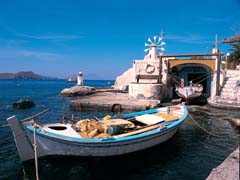
Information about Milos
general information
- Milos belongs to the Cyclades islands cluster
- Milos covers around 160 square km
- Distance from Piraeus is 87 nautical miles
- Inhabitants approximately 4,800
- Connection with Athens via the ports of Piraeus, Rafina and Lavrio
- Connection with the islands of Serifos, Sifnos and Kythnos

Milos is the most southerly island in the Western Cyclades. It is notable for its volcanic soil and for the rich deposits of minerals that lie beneath. It has a distinctive horseshoe shape. The civilisation of Milos is considered to be as ancient as that of Crete, and spans a period of at least 5000 years.
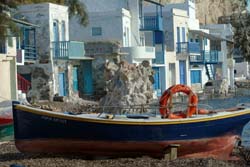 Its fame spread throughout the civilised world thanks to the master-piece of the Venus de Milo, a statue found buried on the island in the 19th century and now in the Louvres Museum in Paris. Adamas, one of the safest natural harbours in the Aegean, is a particularly charming spot, with whitewashed houses, cobbled alleys, balconies crammed with flower-pots and fragrant tamarisks which have been extolled by the poets. Milos Town or Plaka, capital of the island today stands on a hillside overlooking the sea at the foot of the castle. It is a most attractive town, with architecture in the characteristic Cycladic style.
Its fame spread throughout the civilised world thanks to the master-piece of the Venus de Milo, a statue found buried on the island in the 19th century and now in the Louvres Museum in Paris. Adamas, one of the safest natural harbours in the Aegean, is a particularly charming spot, with whitewashed houses, cobbled alleys, balconies crammed with flower-pots and fragrant tamarisks which have been extolled by the poets. Milos Town or Plaka, capital of the island today stands on a hillside overlooking the sea at the foot of the castle. It is a most attractive town, with architecture in the characteristic Cycladic style. 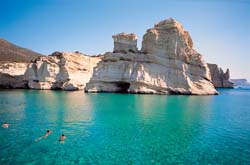 Among the most notable of its churches are those of Our Lady 'Korfiotissa', Our Lady 'Thalassistra' and Our Lady "Messa Panagia". The Archaeological Museum has a copy of the Venus de Milo as well as others finds from various periods. The Historical and Folklore Museum has a collection of folk artefacts, sample of the island's minerals, photographs and historical documents of the greatest interest.
Among the most notable of its churches are those of Our Lady 'Korfiotissa', Our Lady 'Thalassistra' and Our Lady "Messa Panagia". The Archaeological Museum has a copy of the Venus de Milo as well as others finds from various periods. The Historical and Folklore Museum has a collection of folk artefacts, sample of the island's minerals, photographs and historical documents of the greatest interest. At the north-eastern extremity of Milos is the modern resort of Polonia or Apolonia. Close by (3 Km) is Phylakope, the most important centre of population in Minoan times; the ancient city was built in three phases. Next to the archaeological site is the spectacular Papafranga cave. The sea-cave called Kleftiko is at the south end of the island.
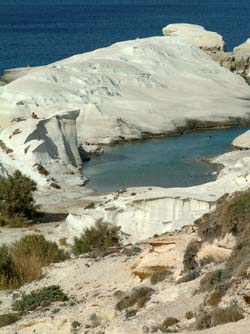 However, the most important monument on Milos is the island's famous catacombs, now open to the public. They are located at the village of Tripiti, 2 Km. from the main town of Plaka and they are among the most important of Early Christian monuments. Milos has excellent beaches at Hivadolimni, Polonia, Adamas, Emborio, Provatas, Paleohori and Agia Kiriaki. The extensive infrastructure for tourism in Milos, its clear waters and its fascinating monuments are helping to attract more and more visitors to the island. The nearby islets of Antimilos, Arkadies and Glaronissia are also of interest, each in its own way.
However, the most important monument on Milos is the island's famous catacombs, now open to the public. They are located at the village of Tripiti, 2 Km. from the main town of Plaka and they are among the most important of Early Christian monuments. Milos has excellent beaches at Hivadolimni, Polonia, Adamas, Emborio, Provatas, Paleohori and Agia Kiriaki. The extensive infrastructure for tourism in Milos, its clear waters and its fascinating monuments are helping to attract more and more visitors to the island. The nearby islets of Antimilos, Arkadies and Glaronissia are also of interest, each in its own way. Milos island seems like it came out of a fairy tale. The rocks, the caves in the sea, the catacombs, the volcanos, the calm beaches and the rocky islets amaze all visitors. No wonder Afrodite came out of Milos.
Here, too, the terrain is mainly mountainous, but the harshness of the bare earth is relieved here and there by vines or fig trees like brushstrokes on it, while pretty little bays form indentations in its coastline. Ferries put in at Merihas, the port on the western side of the island.
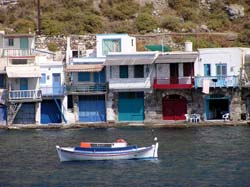 Hora or Messaria, the island's capital is 8 Km. from Merihas and stands on a hillside plateau. A typical Cycladic village, it is noted for its beautiful churches with their fine wood-carving, sanctuary screens and icons (St. Savas, church of the Saviour, Holy Trinity, Theologos). At the monastery of Our Lady 'tou Nikous', which stands on an attractive hill, the feast of the Dormition of the Virgin Mary on 15 August is observed with the traditional festivities.
Hora or Messaria, the island's capital is 8 Km. from Merihas and stands on a hillside plateau. A typical Cycladic village, it is noted for its beautiful churches with their fine wood-carving, sanctuary screens and icons (St. Savas, church of the Saviour, Holy Trinity, Theologos). At the monastery of Our Lady 'tou Nikous', which stands on an attractive hill, the feast of the Dormition of the Virgin Mary on 15 August is observed with the traditional festivities. 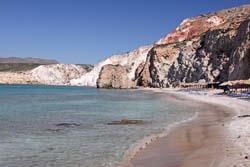 A little way to the south is the island's former capital, which retains its ancient name of Driopida - picturesque village, very typical of the islands. In the north-eastern part of the island lies Loutra, renowned for its thermal springs, which are considered beneficial to sufferers from arthritis, dermatitis and gynecological problems. In the South-east, the monastery of Our Lady Kanala, the patron saint of the island, stands on a very attractive promontory facing towards Serifos, with a beautiful expanse of sandy beach. The building is of great interest and the scenery is reminiscent of a fjiord - in Greek colours. Other good beaches for swimming can be found at Merihas, Episkopi, Flambouria bay (accessible only by boat), Loutra and Agios Stefanos.
A little way to the south is the island's former capital, which retains its ancient name of Driopida - picturesque village, very typical of the islands. In the north-eastern part of the island lies Loutra, renowned for its thermal springs, which are considered beneficial to sufferers from arthritis, dermatitis and gynecological problems. In the South-east, the monastery of Our Lady Kanala, the patron saint of the island, stands on a very attractive promontory facing towards Serifos, with a beautiful expanse of sandy beach. The building is of great interest and the scenery is reminiscent of a fjiord - in Greek colours. Other good beaches for swimming can be found at Merihas, Episkopi, Flambouria bay (accessible only by boat), Loutra and Agios Stefanos. 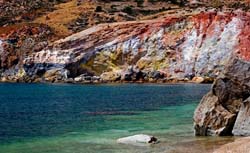 Milos is one of the most beautiful island of the west Cyclades, with a pure cycladic scenery and a tradition in arcitecture, easily seen in the many picturesque alleys and churches of the island. The rocky coasts with the wonderful sandy beaches that suddenly appear, form the island's beaches with the crystal-clear water.
Milos is one of the most beautiful island of the west Cyclades, with a pure cycladic scenery and a tradition in arcitecture, easily seen in the many picturesque alleys and churches of the island. The rocky coasts with the wonderful sandy beaches that suddenly appear, form the island's beaches with the crystal-clear water. You may travel to Milos by sea or by air. There are scheduled trips from Piraeus Port, especially during summer season. There is also regular connection with the islands of Sifnos, Serifos, Kythnos, Santorini, Crete, Rhodes, Folegandros, Ios, Paros and Syros.
Travel in Cyclades
- Cyclades islands
- All Cyclades islands
- Amorgos island
- Anafi island
- Andros island
- Antiparos island
- Delos island
- Donoussa island
- Folegandros island
- Heraklia island
- Ios island
- Kea (Tzia) island
- Keros island
- Kimolos island
- Koufonissia islands
- Kythnos island
- Milos island
- Mykonos island
- Naxos island
- Paros island
- Santorini island
- Schinoussa island
- Serifos island
- Sifnos island
- Sikinos island
- Syros island
- Tinos island

